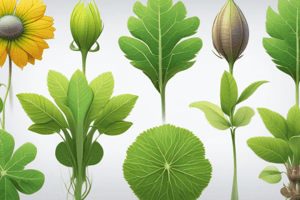Podcast
Questions and Answers
Where does photosynthesis primarily occur in plant cells?
Where does photosynthesis primarily occur in plant cells?
- Endoplasmic reticulum
- Chloroplasts (correct)
- Golgi apparatus
- Mitochondria
What is the primary function of photosynthesis in plants?
What is the primary function of photosynthesis in plants?
- Convert sunlight into chemical energy (correct)
- Breaking down glucose
- Convert chemical energy into sunlight
- Release stored energy
Which pigment is primarily responsible for light absorption during photosynthesis?
Which pigment is primarily responsible for light absorption during photosynthesis?
- Melanin
- Chlorophyll (correct)
- Carotene
- Xanthophyll
What are the final products of photosynthesis?
What are the final products of photosynthesis?
Which process in plants involves releasing stored energy from organic molecules?
Which process in plants involves releasing stored energy from organic molecules?
What is the main difference between aerobic and anaerobic respiration in plants?
What is the main difference between aerobic and anaerobic respiration in plants?
What is the primary site of aerobic respiration in plants?
What is the primary site of aerobic respiration in plants?
In plant signal transduction, what physiological changes occur at the cellular level?
In plant signal transduction, what physiological changes occur at the cellular level?
What drives water movement into plant cells in most cases?
What drives water movement into plant cells in most cases?
Which process involves gene expression, hormone signaling pathways, and environmental cues in plants?
Which process involves gene expression, hormone signaling pathways, and environmental cues in plants?
How do auxins affect plant cell behavior?
How do auxins affect plant cell behavior?
What insights have researchers gained by studying plant physiology processes?
What insights have researchers gained by studying plant physiology processes?
Study Notes
Plant Physiology: Understanding Life Within Plants
Plant physiology is the scientific study of how plants function at the cellular and organismal level. It's concerned with understanding all aspects of plant life, from growth and development to reproduction and defense mechanisms. This multidisciplinary field draws upon biochemistry, genetics, ecology, morphology, and other fields in order to explain the complexities of plant life. Here, we will explore some key areas within this fascinating discipline.
Photosynthesis: Energy Capture
One of the most fundamental processes in plant physiology is photosynthesis, the conversion of sunlight into chemical energy that plants can use to grow and reproduce. Photosynthesis occurs in specialized organelles called chloroplasts within plant cells. This process involves light absorption by pigments such as chlorophyll, which allows for the harnessing of solar energy to drive a series of complex reactions involving carbon dioxide and water, resulting in glucose and oxygen as products.
Respiration: Energy Release
In contrast to photosynthesis, respiration is the process whereby plants release stored energy from organic molecules like glucose, fueling their growth and maintenance. Respiration consists of two main pathways—aerobic respiration (using oxygen) and anaerobic respiration (not using oxygen). Aerobic respiration produces more energy than anaerobic respiration but requires oxygen. The primary site of aerobic respiration in plants is the mitochondria, just as it is in animals.
Signal Transduction: Cellular Communication
Plants perceive and respond to a wide variety of signals, including nutrient availability, light, temperature, and pathogens. These signals are transmitted through the plant via hormones and other signaling molecules, leading to physiological changes at the cellular level. For example, when a plant detects low nitrogen levels, it stimulates root growth to search for additional sources of this essential nutrient. Similarly, exposure to high light intensity may cause the plant to increase its production of protective compounds to shield itself against photodamage.
Water Relations: Osmosis and Turgor Pressure
Water relations in plants are critical for maintaining proper cellular function. In most cases, water moves into plant cells due to osmotic pressure, driven by a higher concentration of solutes inside the cell compared to outside. Maintaining turgor pressure within the cell wall allows for structural support and helps in activities like opening leaf stomata (tiny pores on the underside of leaves), which regulate gas exchange and water uptake.
Developmental Physiology: Growth and Differentiation
Developmental physiology studies how plants grow and differentiate into various tissues and organs. This process involves gene expression and regulation, hormone signaling pathways, and environmental cues. For instance, when a shoot meristem (growing point) encounters light, it responds by elongating and producing leaves. This response is mediated by the production of auxins—a group of hormones known to stimulate cell elongation.
In conclusion, the vast realm of plant physiology encompasses numerous interconnected aspects of plant life. By studying these processes, researchers have gained insights into how plants function and adapt to their environments, information which has implications for agriculture, forestry, and conservation efforts.
Studying That Suits You
Use AI to generate personalized quizzes and flashcards to suit your learning preferences.
Description
Explore the fundamental aspects of plant physiology, including photosynthesis as the process of converting sunlight into energy, respiration for releasing stored energy, and signal transduction for cellular communication. Learn about water relations, growth, and differentiation in plants, and gain insights into how plants function at the cellular and organismal level.




